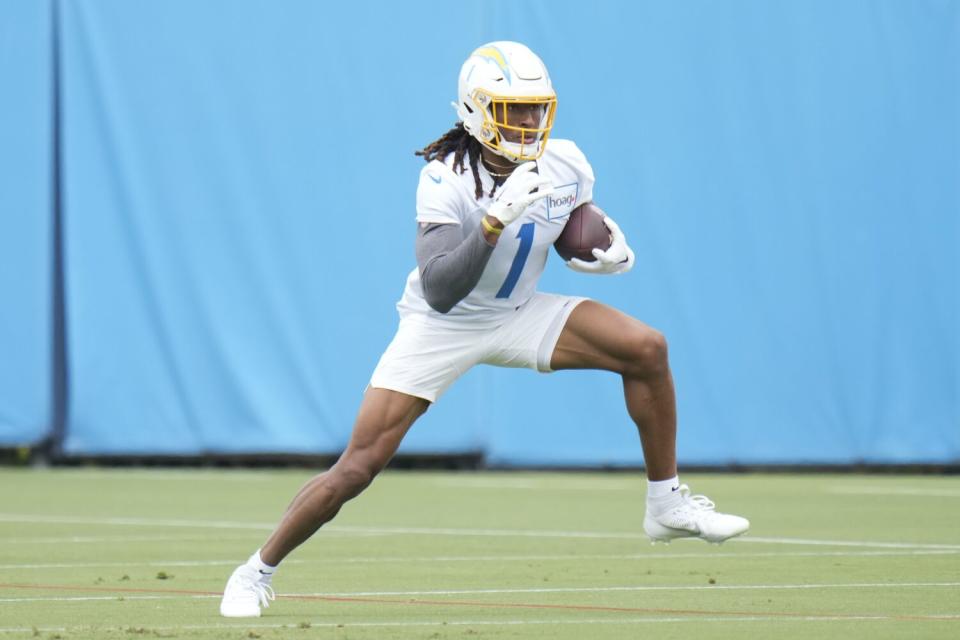
The Chargers are scheduled to play six games in prime time this season, a total that tops the NFL.
Rather oddly, not one of those games — as of now — is against Kansas City, an AFC West rival with whom the Chargers have staged some recent classics.
The Chiefs are set to host the Chargers at Arrowhead Stadium on Oct. 22, with a 1:25 pm kickoff. Although not prime time, that is a cherished, late-afternoon television time slot.
The teams won’t meet again until Week 18 at SoFi Stadium. By that point, the rematch could lack postseason implications, robbing it of its usual significance.
Then again, the game could greatly impact the playoff situations for both and thus be flexed into the final prime-time spot of the regular season.
Either way, the Chargers will receive ample national exposure as they continue their quest to more firmly establish a local foothold.
“The NFL is going to tell you what they think of your team by how many [prime-time games] you get,” coach Brandon Staley said Friday. “We have a good football team, and we’re going to be excited to play whenever we play. But, obviously, when you’re in front of the whole world, it’s extra special.”
Staley spoke on the opening day of the Chargers’ rookie minicamp at the team’s headquarters. Here are a few more highlights from Costa Mesa:
Recess here already? The Chargers are one of four teams — joining Cleveland, Seattle and Tampa Bay — with the earliest possible off week. They don’t play Week 5.
This is typically not ideal, with most NFL personnel preferring to receive their break later in the season after the players have absorbed more body blows.
Asked for his opinion, Staley recalled the 2018 season, when he was an assistant with Chicago and the Bears were off Week 5. That team opened 3-1 and lost two straight after the break, before finishing 12-4 and earning a wild- card spot.
“That’s my experience to draw from,” Staley said. “I just know that … no matter what your bye is, we’ll be ready to play the schedule as it comes.”
First-rounder cashes in: The Chargers signed six of their seven draft picks, the lone exception being second-round edge rusher Tuli Tuipulotu.
Wide receiver Quentin Johnston, the No. 21 pick overall, received $14.18 million fully guaranteed — according to overthecap.com — on his four-year deal.
“Honestly, it was just another stepping stone,” he said. “The money is cool, but I don’t plan on sitting there and blowing it. I’m going to have it in my savings account. I’m not really focused on the money. I’m focused on football.”

After he was drafted, Johnston thanked his parents and announced that his mother, Sherry, could now retire. The NFL distributed a video of the moment to widespread applause.
“She called me two days ago saying that she just put her notice in,” Johnston said. “She’s trying to wait until we get a little break so that I can be up there and throw a little celebration for her.”
Johnston was asked about the significance of being able to thank his mother in such a way.
“I’m a big family person,” he said. “I wouldn’t be in this position I am today if it wasn’t for both of my parents and the sacrifices that they made, getting me to and from different games, different practices, different events when they had stuff planned already.
“I would have done the same thing for my father [Carl], but my father was already retired, so I just gave him a pat on the back. … To give back to them and see the look on their faces, it’s everything.”
Wideouts bonding already: Johnston said he has not met quarterback Justin Herbert, although he noted that Herbert recently followed him on Instagram.
The rookie, however, said he has talked with veteran Chargers wide receivers Keenan Allen, Mike Williams and Joshua Palmer. They visited him at his hotel during his trip to Costa Mesa after being drafted.
“They hit me up, said that they wanted to meet up, talk, get to know me, as well as me getting to know them,” Johnston said. “It was a good experience.”
The Chargers are hoping Johnston’s transition can be helped by the leadership they already have at the position.
“For them to do that, I’m not surprised,” Staley said. “That’s what you need from the leaders on your football team because that’s going to accelerate the development of your young guys. I’m glad that’s happening.”
This story originally appeared in the Los Angeles Times.